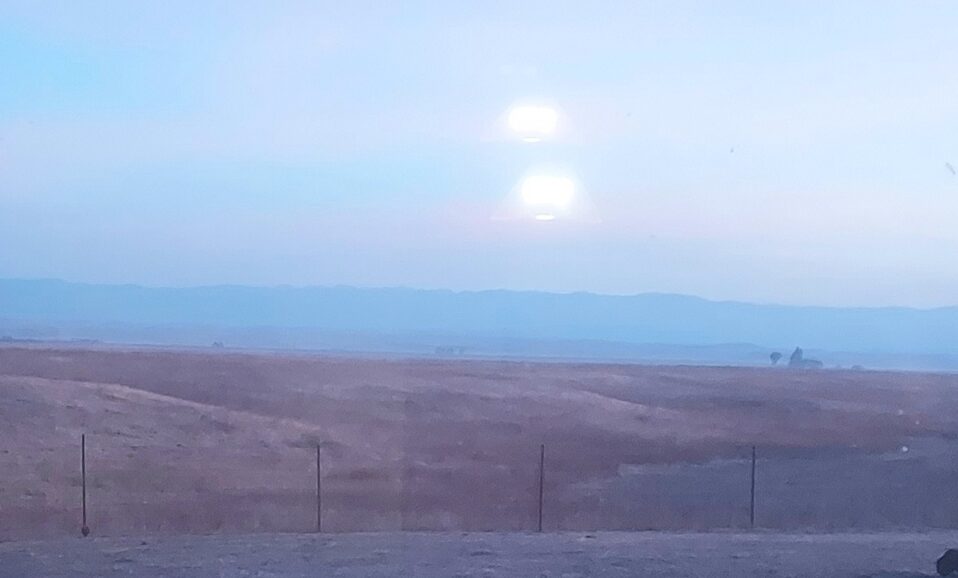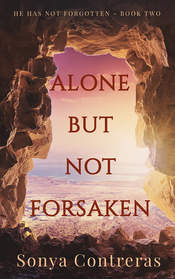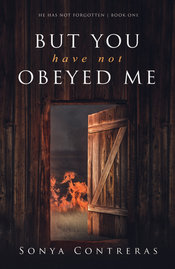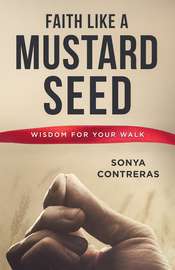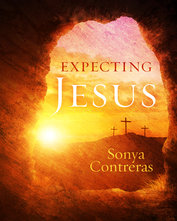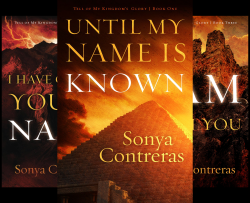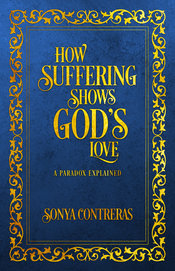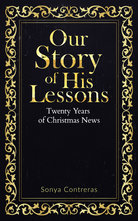- Home
- Index
-
My Books
- Book List
- Writing/Reading Articles Listing
-
My Short Stories
- What God Lost
- What God Lost — Part 2
- When Hope Was Lost
- A Battle in the Heavens
- To Live Forever
- Finding Peace
- Empty Hands
- From Fire and Thunder to Love and Submission
- The Coming One
- Forgiveness Made Possible
- The Innkeeper's Wife
- Do You Have The Right Words?
- The Lamb of God As Told by a Scribe
- What Love Is This?
- When Heaven Came Down
- Family
- Faith

I Am Judas
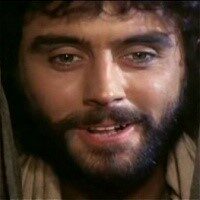 Many would say that the Iscariot stands for Sicarii, an extremist group of Jewish Zealots who undermine the Roman occupation of Judea. I won’t tell you whether or not I hold a dagger in my cloak to kill a passerby without warning.
Many would say that the Iscariot stands for Sicarii, an extremist group of Jewish Zealots who undermine the Roman occupation of Judea. I won’t tell you whether or not I hold a dagger in my cloak to kill a passerby without warning.
But I will tell you a story that changed my life.
News reached me of a man preaching throughout Galilee about the coming Kingdom. He could expel the Romans from our country. I went to hear him. He was gaining a following, under the deception of peace and healing.
When I saw the Man heal all diseases, I thought my father would be pleased with me. “I saw a Man who can heal you.”
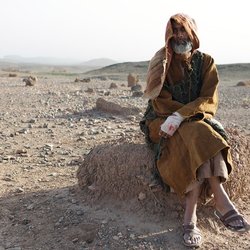 He spat at me. “A leper is cursed for life.”
He spat at me. “A leper is cursed for life.”
But he came.
As we followed the crowds to this Man, I remembered my father as a Pharisee of high standing.
My father held up the Law as a standard that I could never meet. The Law didn’t make me clean. It showed me the depths of my depravity. I could never be acceptable. I felt the disappointment in his beatings; I saw the regret in his eyes. I was his only son, yet I disappointed him.
Now, by the Law’s standard, he had been removed from the Temple and from his house because of his leprosy. Isn’t that what he told me when I couldn’t keep his laws?
That was years ago, the leprosy had changed his body, but not how he controlled people with the Law.
Now we followed the crowds to the Man, Who healed him. He told my father to go to the priest to be declared “clean.”
Did He know that my father had declared men clean or unclean, before his leprosy?
I walked beside my father as he returned to the Temple. I waited for him to thank me for taking him to the Man who could heal him.
He did not.
 I followed the Man who healed. He would remove the yoke of Roman bonds from our shoulders. This man did not prepare armies, nor stir the people with hate. He talked of giving to the poor and loving your enemies.
I followed the Man who healed. He would remove the yoke of Roman bonds from our shoulders. This man did not prepare armies, nor stir the people with hate. He talked of giving to the poor and loving your enemies.
I listened, waiting for his actions to be inconsistent with his words.
He wasn’t.
He chose his disciples, mostly those who lived near Galilee where he was from. They were a rowdy bunch: fisherman who lived a rough life.
But Jesus also chose me. I had never been chosen for anything. My father refused to make me a priest. I had been allowed to join the Zealots, but I could stay only by as long as I proved my allegiance by killing.
None of the other disciples knew me. I was from Kerioth, a city of Judah. I kept quiet and listened. I was educated. I knew the Law. They respected me…accepted me. I belonged.
People gave Jesus money, a token for His words, appreciation for his healing. He received a lot. My father should take lessons from Jesus on how to get the people’s money. He didn’t beg or demand. People gave out of…was it love?
My hand brushed against my purse, tied to my cloak’s belt. It rattled.
The disciples, for that is what His chosen followers were called, had made me their treasurer. If my father could see me now! They misread my quietness for integrity, my education for wisdom. I spoke of giving to the poor. Who wouldn’t want to help the poor? But who is poor? Wasn’t I? I found the extra money helpful.
Being treasurer gave me freedom that the other disciples didn’t have. I went as I pleased. They assumed I was getting food, or giving to the poor. I laughed. They were easily deceived.
Jesus treated me like the others, but with a difference, I couldn’t explain it. He loved all of his disciples. But maybe because I felt love for the first time. Love—I’d never received from my father. He accepted me for who I was. He made me feel I had worth.
It gave me confidence that I might even gain acceptance from my own father. I approached my father with what he valued: the Law. I told him that Jesus’s disciples didn’t wash their hands before eating. I laughed when I saw him listening to Jesus soon afterward.
He confronted Jesus about His disciples’ unwashed hands.
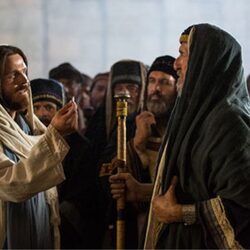 Jesus confronted my father about demanding money for the Temple, instead of allowing the people to honor and take care of their parents. Jesus called him a hypocrite, elevating his traditions and his money over the Law.
Jesus confronted my father about demanding money for the Temple, instead of allowing the people to honor and take care of their parents. Jesus called him a hypocrite, elevating his traditions and his money over the Law.
I nudged Jesus after His comment. “You’ve offended the Pharisees by your words.”
Jesus brushed me aside and stared at my father. “He is blind, leading the blind. Both will fall into a pit.”
I shrugged. I had warned Him. He would experience the anger of my father. I waited for my father to explode.
His neck veins bulged. He glanced at the crowd. What could he say to that? And yet, he must maintain his authority. I could only smile at what he would do when he reached home and took it out on the servants. At least I didn’t cause it, this time.
Jesus’s words matched His life. He didn’t expect to be treated special because of His position as our leader; in fact, He served us.
I waited for him to fail. He did not.
Initially, I think that I deceived Jesus. Being a liar, I find a person’s weakness and use it to my advantage. I looked for Jesus’s. If I could steal from His purse, with His knowledge, then I controlled Him. He was weak. I finally realized that He wouldn’t cause an uprising against Rome.
When I stopped by my father’s house on one of our travels, my father questioned me about him. “Why do you stay with Him? He won’t overthrow Rome. He’s not the man that we seek.” My father couldn’t control Him. Nor would Jesus cower under their power. But why did I stay with Him? Maybe because He seemed real, and He cared for me. I shrugged. “What will the elders do with Him?”
“Remove Him.”
As if Jesus was some fly to be removed! I recognized the look on his face. He would stop at nothing until Jesus was destroyed.
Another time when I stopped at the house, I told him, “Jesus knows your plans…to deliver Him to the Roman courts.”
My father blamed me.
I shook my head. I hadn’t told. I wouldn’t except the blame this time. Jesus pronounced woes on all the Temple’s leaders. I stood up to my father, recounting them. “He said you were unclean. Clean on the outside, like a cup, but full of robbery and self-indulgence on the inside. He called you whitewashed tombs…beautiful on the outside, but full of dead man’s bones and uncleanness.” I tried not to smile. Jesus had described my father well. I was beginning to see the same thing.
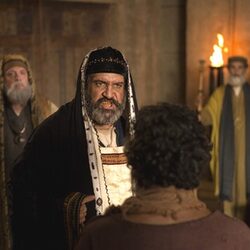 I should have been ready when my father slapped me. I responded, not by cowering, like I would have done as a boy, but by confronting him. “I find His words true.”
I should have been ready when my father slapped me. I responded, not by cowering, like I would have done as a boy, but by confronting him. “I find His words true.”
Our argument escalated from there. The truth of this Man infuriated my father. I didn’t have to lie. I could fight with truth and win.
My father calmed himself. He needed me to inform him of Jesus’s whereabouts. He depended upon my inside information.
Before I left, I suggested that he have Jesus for dinner. He could question Jesus without a crowd. Perhaps even take Him, then.
My father agreed.
When I returned to Jesus, I felt the weight of my deception. The disciples didn’t even glance up as I settled among them. They took my absence as giving to the poor. They thought that I was someone I wasn’t.
But Jesus looked at me. He waited until I looked Him in the eye.
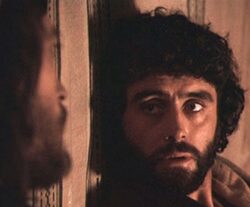 I cringed. How could He make me feel unclean, when all I did was argue with my father? Or was that another lie? Did I lie so much that I didn’t even know the truth? Being around Jesus made me test my words against His truth. I came up lacking. I looked down from His eyes. Why did I care what Jesus thought of me?
I cringed. How could He make me feel unclean, when all I did was argue with my father? Or was that another lie? Did I lie so much that I didn’t even know the truth? Being around Jesus made me test my words against His truth. I came up lacking. I looked down from His eyes. Why did I care what Jesus thought of me?
Later when we were walking to another city, I walked beside Jesus. “About the other night, when I was gone…” Why did I feel that I must explain to Him what I did? He held no power over me. “Why do you think that you’ll be killed?”
Jesus shook his head. “Judas, why couldn’t you cure the boy who was controlled by demons?”
At first, I thought that he was talking about my boyhood—the demons that followed me from my father. But then I shivered, remembering that afternoon a couple weeks back. A father had brought his son to Andrew, Peter, and I. He begged us to heal him. The boy threw himself into our cook fire. It took all of us to pull him from the flames. Even then, the boy beat us for our rescue. I shook my head. “Where did he get his power to throw off four grown men?”
Jesus persisted. “By what power did I cure him?”
“If you have power to control demons, then why could man kill you?”
The only time I remember being touched by my father was when he beat me. Jesus usually didn’t touch me. I kept aloof. But Jesus touched me now. “Because I allow them to.”
I didn’t cringe from His touch, which surprised me. His touch showed me the answer better than any words He could have spoken. Why would His love allow man to kill him? What purpose would it serve? I didn’t understand.
When we came into Capernaum, Peter was accosted by the tax-collectors, asking for the two-drachma tax. Peter responded like he always did, without thinking, and said that we already paid it. Before I could tell him that we hadn’t paid it, Jesus asked him, “Who do kings collect taxes from, their sons or strangers?”
Peter answered, “From strangers.”
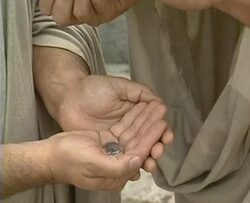 Jesus nodded. “Even so, we won’t offend them. Throw in a fishing line and take the first fish you catch. Look in its mouth. You’ll find a shekel. Give it to the tax collector for you and me.”
Jesus nodded. “Even so, we won’t offend them. Throw in a fishing line and take the first fish you catch. Look in its mouth. You’ll find a shekel. Give it to the tax collector for you and me.”
I laughed. Would Peter actually believe His story? I knew enough about telling lies to know this one was a big one. One that would be worth a good laugh. I followed Peter. When he brought the first fish in, he pulled out a shekel. I asked to see the money. Now that was another way my father could make more money! I was disappointed. Did Jesus speak only the truth? And how did He know the truth?
I didn’t really believe my father would have us for dinner, so when he invited us, I was surprised.
Jesus had told us that He would be crucified. That had to be a Roman execution. What accusation did my father have that would warrant a Roman trial? I took my father into another room. “What plans do you have?”
He shook his head. “Not here.”
I watched my father’s expression. “He said He’d be crucified.”
When my father gasped, I knew it was true. “How does He know?”
I watched the table where Jesus lay.
My father grabbed my arm. “You are still with us. Aren’t you?”
I turned back to stare at him. “Crucify him? Father. Is that how you get rid of someone you can’t answer? His truth makes me wonder about all that you taught me.”
My father swallowed. “You question me?”
I laughed at his inconsistency. “Isn’t that what you taught? That we should not honor our fathers, but give to the Temple. Now I don’t honor you, nor give to the Temple. Your traditions are burdensome. They bind the people to your control.”
My father looked into the room with his guests and gasped.
I followed his look. Was that the woman from down the street? The one that used to come to my father’s chamber. Since Jesus had started his ministry, she no longer came. I laughed. “Seems like Jesus is not only taking your authority from the Temple, but He’s taking your entertainment from your chamber.”
My father smacked me. He glanced into the room to see if others had seen. “We will speak later.”
I refused to rub my face. “I look forward to it.”
I led the way back into the room with Jesus and the disciples. The cushions on the floor allowed the circle to widen. I squeezed in beside Jesus. This dinner would be interesting.
The woman sat at Jesus’s feet, weeping, and wiping his feet with her unbound hair.
My father slid in beside Jesus on his other side. He lowered his voice. “If you knew what kind of woman you allow to kiss your feet, you wouldn’t allow her to touch you.”
I almost grunted out loud. The Pharisees had caught a woman in adultery. They had thrown her at Jesus’s feet and asked if she should be stoned. Surely they knew there had to be two guilty parties! But now my father, in trying so hard to trap Jesus, was as good as admitting to sinning with this woman.
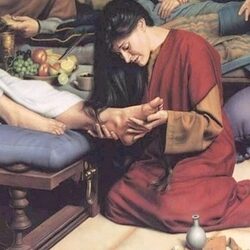 Jesus didn’t even address her sin. “Simon. You invited me to your house, but didn’t greet me with a kiss, yet she has not stopped kissing my feet. You didn’t wash my feet when I entered your house, yet she hasn’t stopped washing my feet with her hair. You offered me a token of hospitality, yet she has given me her heart.”
Jesus didn’t even address her sin. “Simon. You invited me to your house, but didn’t greet me with a kiss, yet she has not stopped kissing my feet. You didn’t wash my feet when I entered your house, yet she hasn’t stopped washing my feet with her hair. You offered me a token of hospitality, yet she has given me her heart.”
While Jesus spoke, she took from her tunic’s pocket a vial of perfume. She poured it on Jesus’s head.
I leaned toward Jesus. “Why did she waste this perfume? She could have sold it for three hundred denarii and given the money to the poor.”
Jesus didn’t speak only to me, He raised His voice so all could hear. “Leave her be. She’s done a good deed. You’ll always have the poor with you; but you won’t always have Me. She prepares Me for burial. Where this gospel is preached, her deed will be spoken in memory of her.”
I finished the dinner in silence. What had I done worthy of remembering?
The following day, I met with the rulers and chief priests. When I entered the room, they stopped what they had been discussing. I approached the chief priest. Should I have come? I saw my father sitting behind the chief priest. He glowed with pride. I‘d never seen him look at me before like that. He even smiled at me. I stood taller and faced the chief priest. “I will turn Him over to you.”
The council agreed. They would pay me thirty pieces of silver.
I nodded and left. I thought if I pleased my father, that I would finally feel worthy, accepted, loved. My decision to turn Jesus over to them would fulfill what Jesus already knew would happen. How would Jesus escape?
I would not only get money for what Jesus already said was going to happen, but I would have enough to help Him when He escaped the Romans’ power. Even as I planned, my insides churned. I could not eat. Could this be right? But even Jesus said it would happen.
I ignored my doubts and looked for an opportunity to turn Jesus over to the rulers.
It was the Passover. That would be a perfect time for the rulers to take Him. There would be no crowds.…But Jesus wouldn’t tell me where we were having it, even though I asked Him several times. He didn’t tell anyone. He sent two disciples ahead of us and gave conditions that must be met before they could prepare the meal.
There were no servants at the door to wash our feet. There was no one that I could send with a message to my father.
No crowds knew where we were. I tried to leave to tell the rulers. This would be perfect.
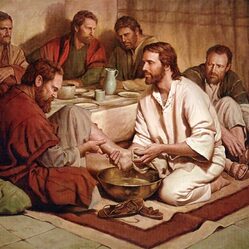 As I considered, Jesus began washing my feet.
As I considered, Jesus began washing my feet.
I felt uncomfortable. “Teacher, you wash my feet?”
How could I turn him over to the rulers, after He lovingly served me like this?
Jesus just nodded. He wouldn’t look at my face, but went around the circle to all of us. When He came to Peter, Peter wouldn’t allow Him to touch his feet.
I shook my head. Peter would never be a ruler. He must learn how to be served.
Then Jesus told us about serving.
He would not free us from Roman rule. Romans did not understand serving, nor did my father. Neither did I. Why did I continue to follow Jesus? He had a way of drawing me, even though He seemed to know my thoughts.
When He finished washing our feet, Jesus settled on the cushions for the meal. He seemed subdued, almost withdrawn. He spoke, “One of you will betray Me.”
All of us looked around the circle. “Is it I?”
I had not considered what I was doing as betraying Him. I was only facilitating what He said would happen. His power would prove greater than my father’s. His power would save Him. I still asked, “Surely, it’s not I, Teacher?”
Jesus nodded. No one else heard when he answered, “You’ve said it yourself.”
How did He know? I had been careful.
Peter gestured to John who leaned on Jesus’s bosom, “Tell us who it is.”
Jesus answered, “I’ll give the bread to him. The Son of Man is to go, just as the Law says, but woe to that man who betrays the Son of Man! It would’ve been better for that man, if he hadn’t been born.”
Jesus handed the piece of bread to me. I took it, but could not eat. How dare He curse me! How did He know it was me? What had I done for Him to know? I couldn’t please my father and please Jesus at the same time. Shouldn’t I honor my father? Isn’t that what Jesus even said? My lies took over.
A dispute broke out about who would be greatest in Jesus’s kingdom. I sighed. These ignorant fishermen expected to rule? Even in this gathering of disciples, I had more authority than any of them.
Jesus silenced them. “The one who is the greatest must become like a servant. Just as My Father gave Me the Kingdom, I grant you food and drink at My table in My Kingdom.”
I sighed. No ruler served. How could He rise against Rome with this plan?
Jesus told me in a tone of resignation, “What you do, do quickly.”
I glanced around. No one else knew why He told me that. I frequently would leave to take care of their food and shelter. They assumed that I left for those reasons now. Jesus knew otherwise. I wondered if I had ever deceived Him. Had He seen through all those times when the money was short, and we had eaten wheat from a field as we traveled through it, even on the Sabbath? I felt the blood leave my face. He had known that I had stolen, but said nothing. I laid down the bread that He’d given me, uneaten, and left.
When I stepped outside, I wrapped my cloak around me tighter against the coolness of the evening. Would I find the rulers before Jesus left here? I ran through the streets, before my mind convinced me not to finish the job. My father’s words raced through my mind—you’re worthless, never able to finish a job. I would complete this job. I would please my father. And Jesus would work one of His miracles and escape the hands of the Romans. His Kingdom would come.
I reached my father’s house and told him where Jesus was. He sent servants to tell the other rulers. Most had just finished the Passover feast. The Pharisees and Sadducees did not come, but sent officers and servants and a Roman cohort, six-hundred men. I gulped at the weapons that they held at their sides. Jesus’s miracle would be great. When we arrived at the house where we had eaten the meal, Jesus and the disciples weren’t there.
I wished that I hadn’t eaten; my meal churned in my gut. I must find Jesus tonight. “He often took us over the ravine of the Kidron where there’s a garden.” I led the way. They carried lanterns and torches. I glanced at the Roman soldiers. Weren’t we trying to overthrow the Romans? Why would we use them for our purposes? They followed me, their lights showing the path in the moonless night.
I saw Jesus from a distance, his little group of disciples hovered around him as we came close.
I backed up and stood toward the back of the officers. They all held clubs and swords. Would they act like a mob?
Jesus stepped into the circle of light from our torches. “Whom do you seek?”
“Jesus, the Nazarene.”
“I am He.”
The Romans soldiers fell back.
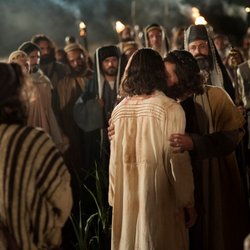 Jesus found me, as I tried to stay hidden amongst all the mob. “Friend, do what you have come for.”
Jesus found me, as I tried to stay hidden amongst all the mob. “Friend, do what you have come for.”
Jesus still called me friend. I tripped as I stepped forward and kissed Jesus on the cheek.
The officers surrounded him, grabbing him.
They acted like a mob, even with the Roman soldier escort. They treated Him like a criminal. This was not what I thought they would do. Why didn’t Jesus do something?
The soldiers stood back, waiting for verification of whom to take.
Peter drew a sword and struck at a servant who stood beside me.
The soldiers restrained Peter, bringing him forward to be taken as well.
Jesus spoke to Peter, “Put your sword away. Won’t I drink of the cup the Father gives?” He bent in the dirt for the ear, and held it to the man’s head. He stopped the bleeding and the ear was restored.
He commanded, even as they took hold of Him, “You only want Me. Let these others go.”
The officers released Peter. But they bound Jesus’s hands and took Him away. Before He was out of the circle of light, He turned one last time and looked at me.
Wouldn’t He show His power and prevent the army from taking Him? His look told me, He accepted my betrayal, He accepted even death.
I did not understand. Show Your power! My mind screamed, but no words came out. When the lights of their torches were no longer visible. I shook my head. I ran to where I was to meet the elders at the Temple. My heart raced as I saw again Jesus’s hands bound behind Him. Had He lost His power? Why didn’t He fight?
The passageway of the Temple was dark, lit only by the scones on the walls. I wished to be done with the whole thing. I stumbled into the room where they waited, pausing at the doorway. They were lighting a candle on a table in the middle of the assembly. Had they been sitting in the dark? I looked around the circle of leaders. “Where’s the silver?”
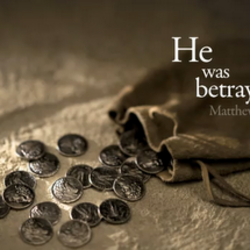 The leader counted out the money from the chest where the people gave their tithes and offerings.
The leader counted out the money from the chest where the people gave their tithes and offerings.
Hurry up! My thoughts screamed. I shifted from foot to foot, waiting as he took his time. The sooner I left this room, the better I would feel. I licked my lips, conscious of the silver accumulating in front of me. When thirty pieces of silver were piled there. I poured them into my purse, pulling the drawstring closed. I secured it in the folds of my cloak. It was heavy. Keeping my hand on the bottom of my purse, I reassured myself of its contents. It could tear my pocket, or be visible to one who would want to steal.
I walked to the doorway and looked back to where my father sat. I nodded, then left. I could not run now, because the coins clanged too noisily. But I hurried to my father’s house. I went to my chamber, still available even though I had been gone. I removed a tile from the floor where I hid my money. I placed the entire purse in the hole and replaced the loose tile. I breathed heavily as I considered.
Where should I go? Where would the disciples go? I had spent the last three years following Jesus. Now I felt like a lost son, unable to go home. I laughed, but it sounded hollow even in my chamber. I was home, but felt abandoned.
Why hadn’t Jesus shown His power and usurped the Roman soldiers before they took him? Did He really mean to die?
What had I done?
I paced, stepping on the tile that hid the blood-money. I had given the only man who had ever loved me to the power of the hated Romans. I was worse than a tax-collector.
I had stabbed people to stir up hate for the Romans. I had followed Jesus because He told of starting a new Kingdom. Jesus talked about freedom, peace, life. Isn’t that what He promised? Why didn’t He make it happen? He spoke, and demons listened. Surely the Romans weren’t stronger than a demon!
I couldn’t remove the image of Jesus with his hands tied behind his back, being pushed through the garden to His trial.
My pacing took on a frantic speed. It was as if I could outrun my thoughts.
I thought about all the times that Jesus had made me feel worthy, and loved. Then about His words that one would betray Him. Those were strong words. I didn’t betray Him.
“What you do, do quickly. Quickly. Quickly….” The words echoed in my head. I pulled my hair and tore my tunic. I ripped at my cloak where I had carried my purse. What had I done?
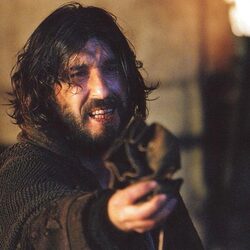 It was early morning when I finally decided what I should do. I grabbed my purse and returned to the council. They were still meeting. I was relieved, but too preoccupied to wonder why. They didn’t hold trial before morning sacrifices, nor would they execute a man before the Passover.
It was early morning when I finally decided what I should do. I grabbed my purse and returned to the council. They were still meeting. I was relieved, but too preoccupied to wonder why. They didn’t hold trial before morning sacrifices, nor would they execute a man before the Passover.
When I stepped into the room, the chief priest demanded, “What do you want?”
I tried to speak, but couldn’t. I coughed, clearing my throat. “I’ve sinned by betraying innocent blood.” I couldn’t look at my father. I didn’t want to see his rejection and disappointment in me, again. I could still see Jesus’s final look at me.
The chief priest shrugged, not even considering my words. “What is that to us?”
I couldn’t undo my deed. I saw it in their faces. I opened my purse and dumped the coins on the floor. The thing that I had valued, I now rejected. Money couldn’t buy peace. Money couldn’t buy back one Man’s innocent life. The coins rolled and clanked. Before they stopped rolling, I left.
I had sinned. My lies had been found and I could not rationalize them nor undo them. I could not deceive my father. I had not deceived Jesus. And I could no longer deceive myself. I had no hope.
I don’t remember walking to the garden where Jesus spent a lot of time with us. It was there that He told us of His Kingdom, of a place He was preparing for His own. He warned of false teachers, telling lies that didn’t match with what He said, using the Law and adding to it. I could see the disciples and Him sitting around asking questions, giving peace.
Where was the peace now? What had I done to the Teacher?
The image of His bound hands pounded in my mind. “What you do, do quickly…” A donkey stood tied to a tree nearby. Was it the donkey that brought Jesus into the city a week ago? All I could see was Jesus bound, innocent, turned over to the Romans. It was my fault. I grabbed the halter off the donkey and wrapped it around my neck. I ran to the nearest tree that overhung the ravine. I climbed a branch and tied the other end of the halter to it. I would end my life, rather than see what my actions had brought. I could not please my father, but neither had I pleased Jesus. My life was cursed. I would no longer see the disappointment in the eyes of Jesus. I had tried to outlive my father’s disappointment. But it clung to me. Always reaching for approval, I had never attained it. I was fulfilling my father’s statement. I was good for nothing, never finishing a task.
I could have found that acceptance in Jesus. He had given me worth. But I had chosen to betray Him. I was cursed, even in His sight. What hope did I have of ever finding acceptance? Jesus couldn’t save people from the bondage of their own lies and deceit, could He? Or was that another lie? Would Jesus offer forgiveness to even me? No. I shook my head. He had cursed me.
I jumped. The halter rope jerked my neck. I took my life.
Sources:
http://www.biography.com/people/judas-iscariot-9358799
https://en.wikipedia.org/wiki/Judas_Iscariot
https://en.wikipedia.org/wiki/Sicarii
http://www.goodnewsaboutgod.com/studies/spiritual/home_study/judas_father.htm
http://www.gotquestions.org/Judas-Iscariot.html
http://www.letusreason.org/wf15.htm
http://www.newadvent.org/cathen/08539a.htm
http://terrorism.about.com/od/groupsleader1/p/Sicarii.htm
http://www.whatchristianswanttoknow.com/judas-iscariot-bible-story-and-profile/
I write about what matters...to you---
women, wives and moms---
about your family, faith and future.
I write about what's hard, what helps and what heals.
I show you how it's done. And not done.
I hold your hand as you find what matters to the Savior.
And let go of those things that mattered to you, but not to Him.
I write about what matters...to Him.
Sonya Contreras

Author of Biblical fiction, married to my best friend, and challenged by eight sons’ growing pains as I write about what matters.
Receive weekly articles by giving your email address below:
